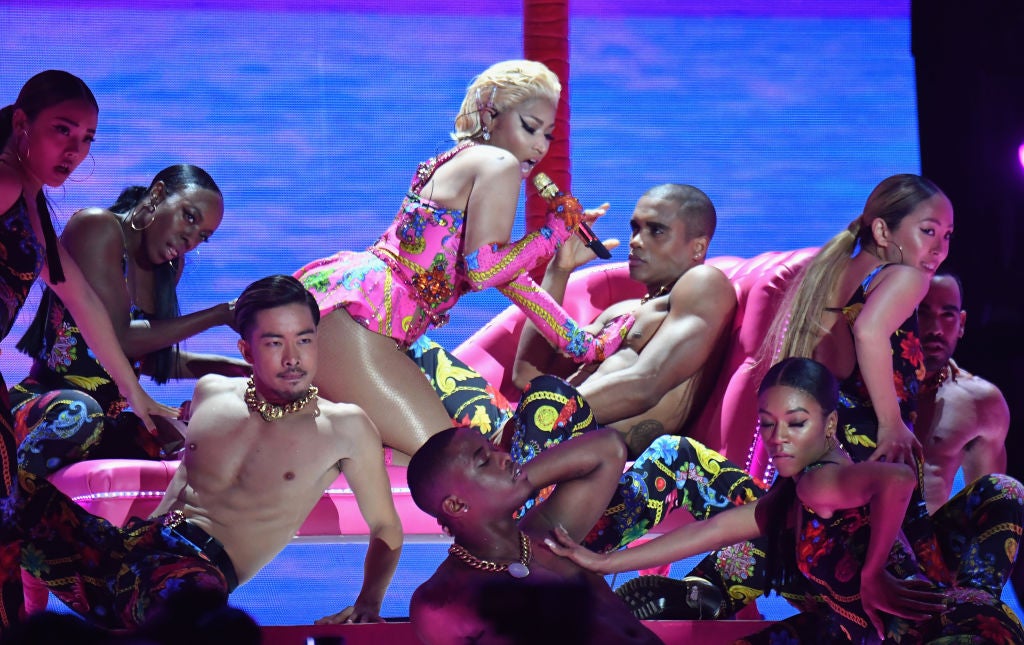Nicki Minaj is a global phenomenon, so when it was announced that, on July 18, she would be headlining the Jeddah World Fest in Saudi Arabia, the whole world paid attention.
But after human rights advocates applied pressure, and Minaj learned more about the stakes of lending her star-power to a nation that regularly attacks the most vulnerable, punishes political expression, and only reversed its ban on women drivers last summer, she canceled her set.
Minaj’s stance is consistent with Black artistic traditions of blazing or abstaining from stages for human rights reasons. While Saudi Barbz (super-fans) likely wish they got to spit about rum, fun, summer, and share Megatron vibes while hitting a slow wine, far more is at stake. Politically, socially, morally and ethically, Minaj reminds us that the time to take a stand—from where we stand—is now.
It matters.
Thor Halvorssen, CEO and president of the Human Rights Foundation (HRF), penned a letter pleading with Minaj not to perform in Saudi Arabia. Halvorssen said Saudi Prince Mohammed bin Salman violates millions of Saudi people’s rights. Halvorssen cited the kingdom’s arbitrary enforcement of Islamic law, state targeting of women and religious minorities, and the absence of meaningful checks and balances between the prince and the judiciary.
After the letter went live, Minaj publically rescinded her promise to perform there, despite the reportedly seven-figure payment she would have earned.
In an exclusive statement to the Associated Press, Minaj explained her rationale as a woman, ally, and artist who benefits from and builds on free expression.
“After careful reflection I have decided to no longer move forward with my scheduled concert at Jeddah World Fest. While I want nothing more than to bring my show to fans in Saudi Arabia, after better educating myself on the issues, I believe it is important for me to make clear my support for the rights of women, the LGBTQ community and freedom of expression,” Minaj said.

In HRF’s letter, Halvorssen called the kingdom of Saudi Arabia “among the worst violators of basic individual rights” and noted the kingdom “scored the worst possible grade in Freedom House’s 2019 Freedom in the World Index,” which focuses on civil liberties and political rights. On a 100-point scale, Saudi Arabia earned a seven.
Similarly, Human Rights Watch connected the Saudi prince with the state murder of journalist Jamal Khashoggi, himself of Saudi descent. The watchdog news source also called out Saudi Arabia for arbitrary and indefinite detainments of non-violent activists and dissidents, including 10 “prominent women’s rights activists” after May 2018—around the same time the nation reversed its gendered-driving-ban.
Beyond indefinite detentions, Human Rights Watch reported that “dozens of human rights defenders” serve lengthy prison sentences for criticizing the state or advancing “political and rights reforms.” Matters of love, relationship and bodily autonomy are also grim in Saudi Arabia. The kingdom criminalizes same-sex sex, which is punishable by death.
For Minaj, backing out of the Saudi show reflects sensitivity to the lived experiences of and persecution experienced by people who are neither cisgender nor heterosexual. As is widely known, LGBTQIA+ people form a noteworthy contingent of her Barbz.
When combined with Saudi state mistreatment of migrant communities, including massive deportations of Black Ethiopians, and sexist violence, Minaj’s position not only makes good sense, it is beautifully familiar. For Black artists, the politicized performance is well-trodden.
Minaj Follows Radical Tradition Of Black Artists
Before Nicki Minaj, an Afro-Trinidadian woman, captivated hip-hop fans in the U.S. and abroad, Josephine Baker, an African-American woman turned French citizen, also captivated global audiences. Beyond physical beauty and artistic skills, Baker and Minaj both bucked the seen-and-not-heard expectations of women through their profound statements and acts of creative agency.
“… Years before the critical movement marches of the 1960s, Baker was insisting on desegregated venues at her performances, picketing restaurants that denied her fair treatment, and delivering speeches about the evils of Jim Crow,” Matthew Guterl wrote for the New Republic.
Baker, the only woman who spoke at the March on Washington for Jobs, Justice and Freedom, famously refused to perform for racially segregated audiences.
Black artists, including Baker, have also included education and non-violent resistance in their toolboxes to combat racist and repressive societies.
“You must go to school, and you must learn to protect yourself. And you must learn to protect yourself with the pen, and not the gun,” Baker said. “Then you can answer them, and I can tell you — and I don’t want to sound corny — but friends, the pen really is mightier than the sword.”
In that spirit, Minaj’s deselection of Saudi Arabia as an audience for her pen game may reflect disbelief in the liberalization of the kingdom. Her performance cancelation also reflects refreshing self-awareness because she delved deeper into social injustice across borders and shared that her knowledge about Saudi Arabia steered her against a symbolic co-sign in the midst of so much entrenched oppression.
“This is what leadership looks like. We are grateful to Nicki Minaj for her inspiring and thoughtful decision to reject the Saudi regime’s transparent attempt at using her for a public relations stunt,” Halvorssen wrote.
While neither Nicki Minaj nor Josephine Baker created these domestic or international regimes, their conscious choices as global artists can remind communities to question the societies they live in, question the societies they see and question the moral consequences of associating with certain societies.
The time for freedom is now.
Imani J. Jackson is an interdisciplinary scholar, lecturer and writer. The multi-generational Floridian works as a legal fellow at the Brechner Center for Freedom of Information.


